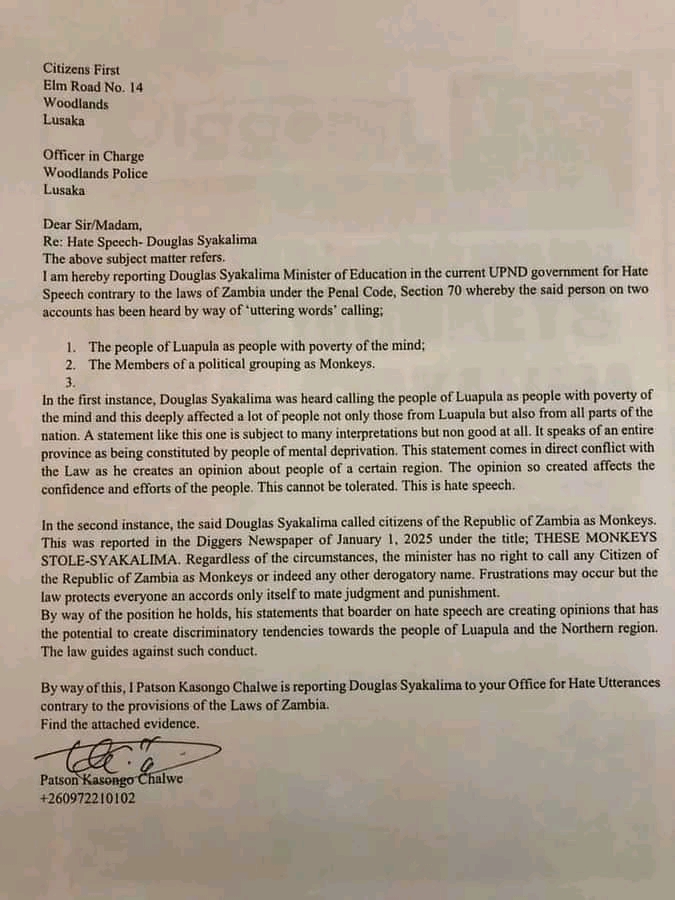Police Refusal to Process Hate Speech Complaint Against Minister Raises Concerns Over Bias and Selective Enforcement
The refusal by Woodlands Police Station to accept a hate speech complaint against Education Minister Douglas Syakalima has raised significant concerns about the neutrality of law enforcement in Zambia. Patson Kasongo Chalwe, a member of the Citizens First Central Committee, attempted to report Syakalima for remarks that allegedly insulted the people of Luapula and referred to certain political group members as “monkeys.” However, police officers at the station refused to file the complaint, expressing fear that processing the case would cost them their jobs. This incident has drawn attention to potential political influence over the police force and questions the impartiality of the justice system.
This case is not an isolated one, as there have been instances in the past where the Zambia Police have acted swiftly in response to similar allegations of hate speech. In 2022, opposition leader Sean Tembo, president of the Patriots for Economic Progress (PeP), was arrested and charged with hate speech after he allegedly made inflammatory statements against the government. His detention for six days highlights the readiness of the police to take action when the accused is from the opposition, raising concerns of selective enforcement of the law.
Another case in 2022 involved Saboi Imboela, the leader of the National Democratic Congress (NDC), who was charged with criminal libel and hate speech after she criticized President Hakainde Hichilema’s media director on social media. Imboela’s arrest demonstrates the willingness of law enforcement to pursue individuals who publicly challenge government officials, further suggesting that the police may be more inclined to target opposition figures for similar offenses, while seemingly protecting those in power.
In 2023, the Zambia Police arrested Chilufya Tayali and Christopher Kapita for spreading false information and engaging in hate speech. The arrests of these individuals for making derogatory remarks against government officials underscored the state’s readiness to clamp down on hate speech. However, the lack of consistency in how such cases are handled has raised questions about the equal application of the law, particularly when powerful political figures are involved in similar incidents.
The refusal to process Kasongo’s complaint against Syakalima is particularly troubling because it reveals potential bias within law enforcement when high-ranking government officials are implicated. The police officers’ refusal to take action due to fear of job loss suggests a troubling political climate, where the justice system may be swayed by political pressure. Such a scenario undermines the very foundation of the rule of law and the idea that all citizens, regardless of their position, should be equal before the law.
This situation also poses a significant threat to the public’s trust in law enforcement. When the police refuse to act on valid complaints, especially those involving hate speech by government officials, it creates a perception that the law is applied selectively based on political affiliation. This damages the credibility of the police and undermines the public’s confidence in the judicial system, leading to a diminished faith in the fairness of the legal process.
To restore trust and ensure the integrity of the justice system, it is essential that law enforcement operates without political interference. Police officers must be allowed to perform their duties impartially, regardless of the political standing of the individuals involved. Furthermore, the law must be applied consistently to all citizens, ensuring that powerful figures are not shielded from prosecution while ordinary citizens face legal consequences. Transparent procedures must be established for addressing complaints against public officials, reaffirming the principles of justice and equality for all.
KUMWESU JAN 4, 2025
Police Refusal to Process Hate Speech Complaint Against Minister Raises Concerns Over Bias and Selective Enforcement
